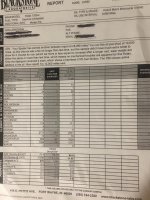BajaRon
Well-known member
I don't usually post things like this as the OP. But every once-in-awhile I come upon a service or product that really impresses me. I hope this is of use to you.
I get my oil tested every time these days. Spyder, Ryker, VW TDi, F-250 PowerStoke Diesel. Haven't done my lawnmowers or ATV. You have to draw the line somewhere! This is something that I used to feel was only for the extremely anal person. But I have since changed my mind. Change can be good!
What with vehicles getting so expensive, and repair costs going up as the vehicle loses value. I have come to the conclusion that it is cheap insurance. Oil analysis gives you a lot of very valuable information about your vehicle that you really have no other way of knowing. Other than when it breaks and the mechanic tells you what you should have done to prevent it. I've tried a number of analysis services over the years. They have all been quite reliable and professional. I've been quite satisfied. But awhile back I decided to give Blackstone laboratories a shot. Wow! They take this to a whole new level! They are very pro-active. Give a lot of good, ancillary information with every analysis. Reply to my emails if I have any questions, usually within a few hours. Their answers are very clear. They do not try to impress with technical jargon. Just very useful input, helping you to get the most out of the hard data in the analysis itself.
I highly recommend getting an oil analysis, at least just 1 time (though to get full benefit you need to get a track record to make comparisons). Most will only need 1 each year. Knowledge is power! Or so they say. But I do it for the piece of mind it brings.
Have a Great New Year everyone!
I get my oil tested every time these days. Spyder, Ryker, VW TDi, F-250 PowerStoke Diesel. Haven't done my lawnmowers or ATV. You have to draw the line somewhere! This is something that I used to feel was only for the extremely anal person. But I have since changed my mind. Change can be good!
What with vehicles getting so expensive, and repair costs going up as the vehicle loses value. I have come to the conclusion that it is cheap insurance. Oil analysis gives you a lot of very valuable information about your vehicle that you really have no other way of knowing. Other than when it breaks and the mechanic tells you what you should have done to prevent it. I've tried a number of analysis services over the years. They have all been quite reliable and professional. I've been quite satisfied. But awhile back I decided to give Blackstone laboratories a shot. Wow! They take this to a whole new level! They are very pro-active. Give a lot of good, ancillary information with every analysis. Reply to my emails if I have any questions, usually within a few hours. Their answers are very clear. They do not try to impress with technical jargon. Just very useful input, helping you to get the most out of the hard data in the analysis itself.
I highly recommend getting an oil analysis, at least just 1 time (though to get full benefit you need to get a track record to make comparisons). Most will only need 1 each year. Knowledge is power! Or so they say. But I do it for the piece of mind it brings.
Have a Great New Year everyone!
Last edited:

